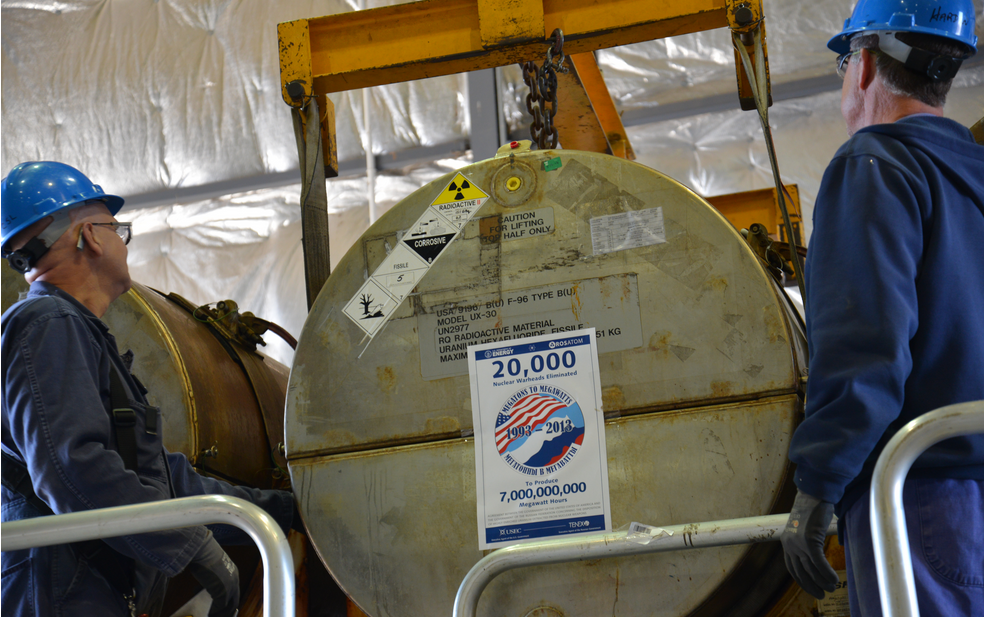
New Managing Director for Bellona Norway
The Board of the Bellona Foundation has appointed former Minister of Climate and the Environment Sveinung Rotevatn as Managing Director of Bellona No...
News

Publish date: August 20, 2015
Written by: Charles Digges
News
Vadim Mikerin, a former executive with the Russian state nuclear fuel conglomerate Tenex has agreed to plead guilty in the US to money laundering and bribery charges in connection to a cooperative disarmament deal between Washington and Moscow, The Wall Street Journal reported.
Mikerin’s plea hearing is scheduled for August 31 in federal court in Greenbelt, Maryland, the newspaper said. He could face a sentence of 20 years.
Mikerin, the former general director of Tenam USA, which is indirectly under control of Russian state nuclear corporation Rosatom, was charged with conspiracy to commit extortion.
Mikerin, having previously maintained his innocence, agreed yesterday to plead guilty to 20 cases of alleged bribes worth $1.7 million.
 Vadim Mikerin pleaded guilty more than $2 million in bribes for non-competetive contracts to send reactor grade uranium to the US via the Megatons to Megawatts program. (Photo: Tenam USA)
Vadim Mikerin pleaded guilty more than $2 million in bribes for non-competetive contracts to send reactor grade uranium to the US via the Megatons to Megawatts program. (Photo: Tenam USA)
Mikerin is the second major Russian nuclear official in a decade to be felled for defrauding a cooperative US-Russian nuclear program. The first was Yevgeny Adamov, former chief of Minatom, Rosatom’s predecessor.
Three US nationals, Daren and Carol Condrey, and Boris Rubizhevsky, were also charged with conspiracy to commit wire fraud in connection with the case, various public documents from the US Attorney General’s office in Maryland show.
Mikerin was initially arrested on October 29, 2014 on charges of accepting kickbacks from uranium deals between Russia and the United States under the expired Megatons to Megawatts cooperative disarmament program.
He was denied bail and has remained in jail in Washington, D.C. since his arrest, the Russian Legal Information Agency Rapsi reported.
The disarmament program
Between 1993 and 2013, Russia down blended 500 metric tons of highly enriched uranium for sale to and use in US commercial reactors under the HEU-LEU, or Megatons to Megawatts program.
 Electricity produced from bomb grade Russian uranium provided 10 percent of America's electricity over a 20 year period. (Photo: NRC)
Electricity produced from bomb grade Russian uranium provided 10 percent of America's electricity over a 20 year period. (Photo: NRC)
By the program’s end in December 2013, Megatons to Megawatts had disposed of enough highly enriched uranium to build 20,008 warheads, according to the US Enrichment Corporation, which was Tenex’s American partner in the agreement.
Uranium sold to the US via the program provided some 10 percent of electricity generated in America during the program’s duration.
Megatons to alleged megabucks
According to court documents, Mikerin allegedly supervised the sale and shipment of the uranium sent to the US under the program via a network of bribes and kickbacks to officials at Russia’s state nuclear corporation Rosatom.
Public documents from the Federal Bureau of Investigation (FBI) show that investigators suspected Mikerin as far back as 10 years ago of participating in a broader scheme to conceal the kickbacks paid to Rosatom officials by routing them through shell companies and secret accounts in Cyprus, Latvia and Switzerland.
According to the FBI documents released in October, US Attorney Rod Rosenstein said that beginning in 2006, Mikerin allegedly conspired with the Condreys, the principals of the Maryland-based Transport Logistics International.
 Truckloads of dowblended uranium arriving at the United States Enrichment Corporation. ( Photo: Courtesy of centrusenergy.com)
Truckloads of dowblended uranium arriving at the United States Enrichment Corporation. ( Photo: Courtesy of centrusenergy.com)
Beginning in 1996, Transport Logistics International was Tenex’s contractor to transport uranium from Russia to the United States. Rubizhevsky, a US national of Russian descent, and formerly president of New Jersey’s Nexgen Security, served from 2011 through 2012 as a consultant to Mikerin’s Tenam, said the FBI documents.
Beginning in 2006, Mikerin allegedly conspired with the Condreys, Rubizhevsky and others to defraud Tenex by scheming to have uranium shipment contracts awarded to Transport Logistics International and its affiliated companies without having to compete for them.
The Foreign Corrupt Practices Act makes it a crime to bribe officials to win business.
Complaints and affidavits referred to by the FBI say the Condreys and Transport Logistics International bribed Mikerin in exchange for sweetheart non-compete contracts from Tenex.
The documents also say Transport Logistics International has also pursued other business ventures with Tenex for transportation under separate contracts.
From at least 1996 to about 2013, the Condreys and others allegedly paid at least $1,692,995 in kickback payments through their company to Mikerin in exchange for more than $33 million in noncompetitive contracts from the Russian nuclear fuel giant.
The US Attorney General’s office said affidavits in its possession allege Mikerin recruited Rubizhevsky in 2011 and his company to act as his middleman in accepting Transport Logistics International’s kickback payments for uranium shipment contracts.
 Rosatom's headquarters in Moscow.
Credit: Charles Digges/Bellona
Rosatom's headquarters in Moscow.
Credit: Charles Digges/Bellona
Investigators say the bribes were disguised as consulting fees. Other payments from the Condreys allegedly flowed into offshore shell companies controlled by Mikerin.
Rosatom today refused telephone requests from Bellona to comment on the case, saying its position hadn’t changed from the statement it issued directly following Mikerin’s arrest.
“Rosatom has a zero-tolerance policy on corruption in all of its national and international activities, and in the interests of justice, would welcome the opportunity to contribute to enquiries into the alleged American fraud, including through representation at any court proceedings,” the statement read, adding that it had launched an internal investigation on the relationship between TENAM and Transport Logistics International.
Other motives behind the arrest?
The Russian Ministry of Foreign affairs told the independent Russian television station TV Rain (in Russian) that it suspected there might be other motives behind Mikerin’s prosecution.
 Yevgeny Adamov. (Photo: Rosatom/Minatom)
Yevgeny Adamov. (Photo: Rosatom/Minatom)
According to an April 30 report in The Wall Street Journal, Mikerin was prior to his arrest approached by investigators with an offer to enter into “undercover cooperation” against unspecified “high ranking government officials” in Russia, according to a court motion seen by the newspaper.
After a four-hour interrogation during which he refused to cooperate, he was arrested and charged, the paper said.
Former Minatom chief Adamov was picked up on an Interpol warrant in Switzerland in 2005 on a US charge of swindling $9 million in US aid for nuclear safety upgrades in Russia. Russia countermanded the US extradition request for Adamov immediately, charging him with graft in his home country.
A Swiss court, fearing the arbiter of Russia’s nuclear secrets might be tortured in American hands, sent him to stand trial in Russia.
He was found guilty and, due to his age, received a 5 and a half year suspended penal colony

The Board of the Bellona Foundation has appointed former Minister of Climate and the Environment Sveinung Rotevatn as Managing Director of Bellona No...

Økokrim, Norway’s authority for investigating and prosecuting economic and environmental crime, has imposed a record fine on Equinor following a comp...

Our op-ed originally appeared in The Moscow Times. For more than three decades, Russia has been burdened with the remains of the Soviet ...

The United Nation’s COP30 global climate negotiations in Belém, Brazil ended this weekend with a watered-down resolution that failed to halt deforest...